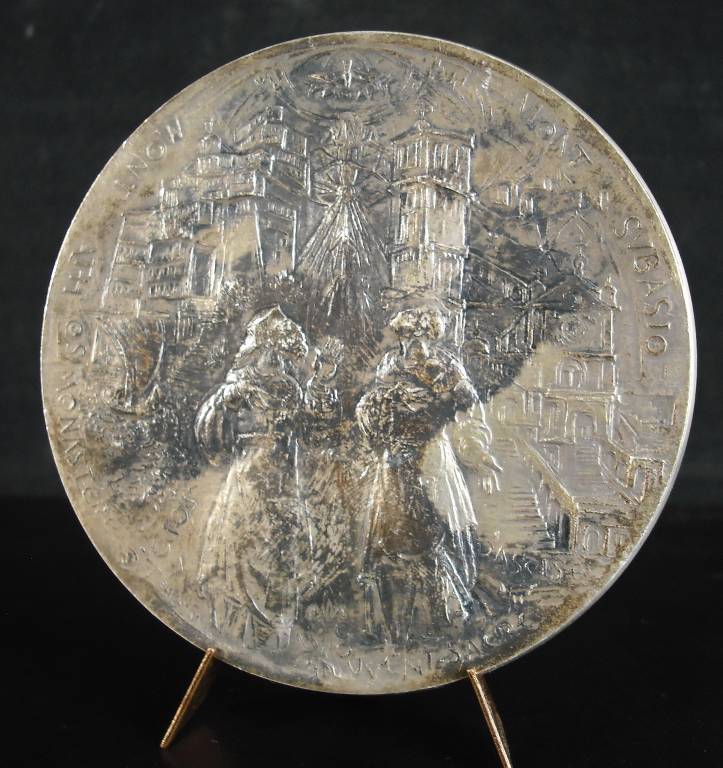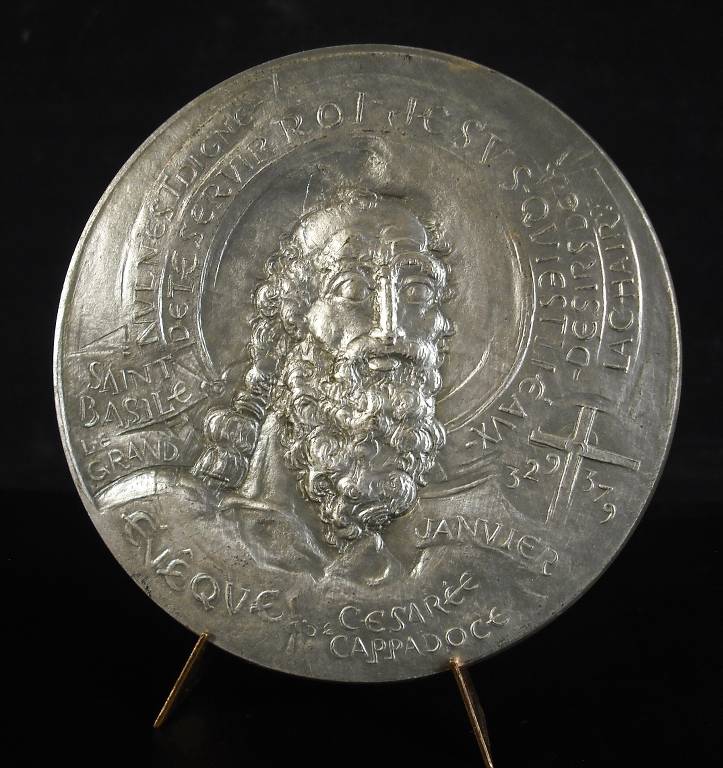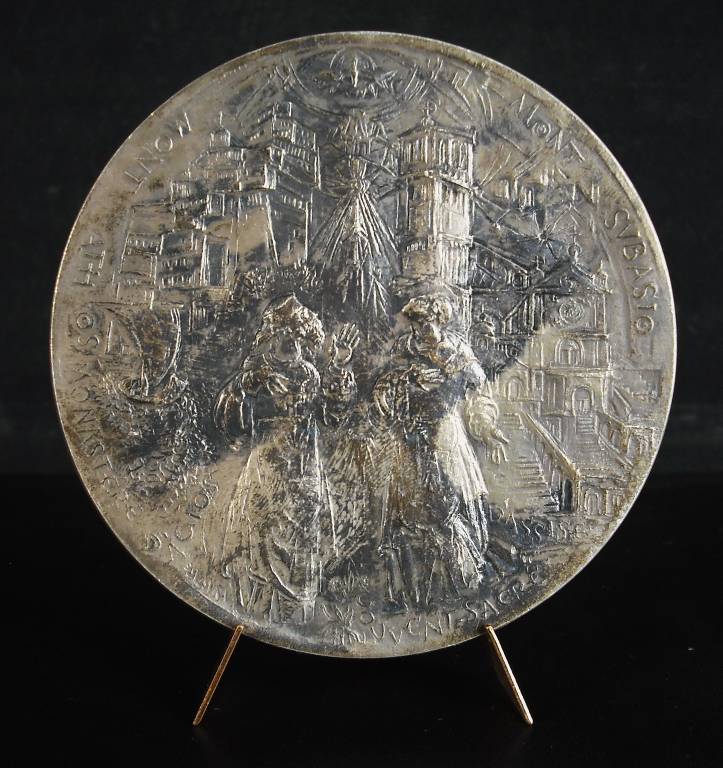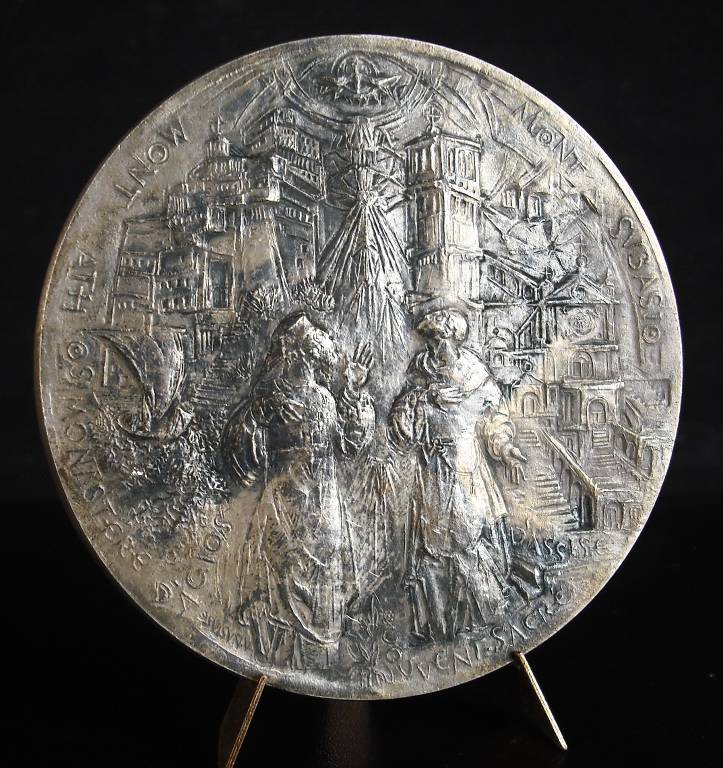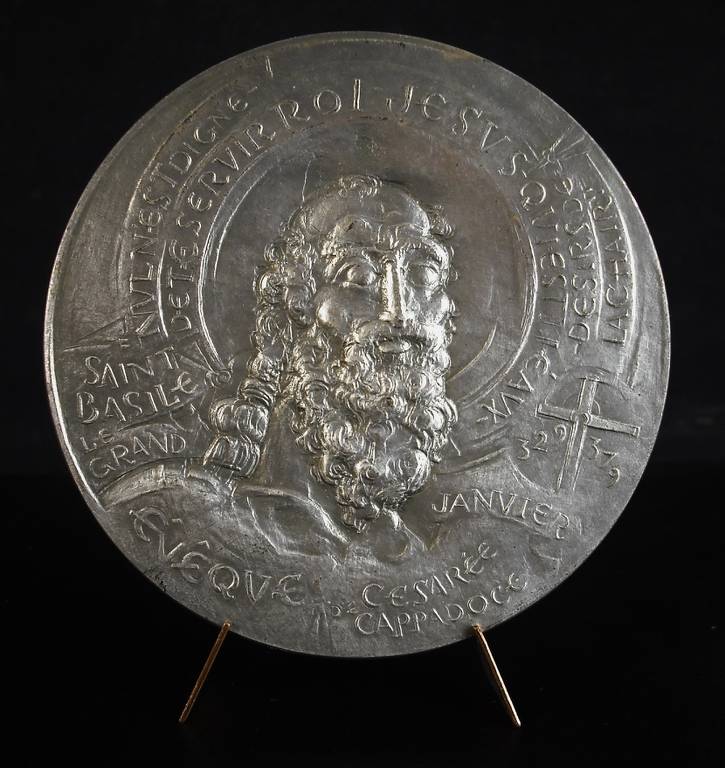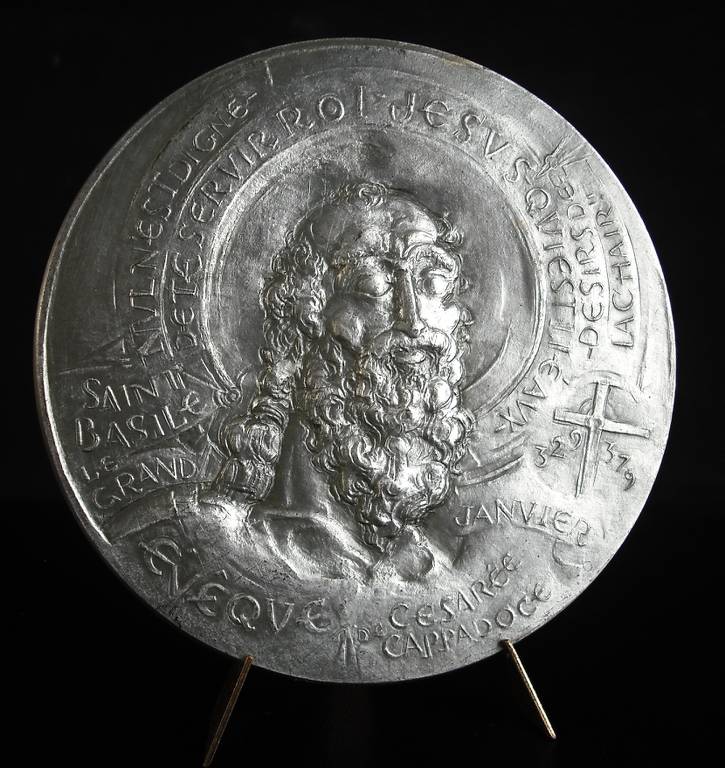_
shot 38_262
shot 38_262
Silver-plated copper medal from the Paris Mint (cornucopia hallmark from 1880).
Medal struck in 1975.
Some minimal traces of handling and a silver patina defect on the reverse.
Engraver : Demeter Anastasius .
Dimension : 90mm.
Weight : 343 g.
Metal : silvered copper (not silver but silvered).
Hallmark on the edge (mark on the edge) : cornucopia + copper + 1975.
Quick and neat delivery .
The support is not for sale.
The stand is not for sale.
Basil of Caesarea, born in 329 and died, according to tradition, on January 1, 379 in Caesarea of Cappadocia, is one of the main Fathers of the Church. He was called, during his lifetime, Basil the Great because of his moral and ecclesial authority.
Founder of a monastery in the region of Pontus, on the Black Sea, he is the author of a rule known as the rule of Saint Basil. This became the main monastic rule of the Eastern Church and partially inspired the rule of Saint Benedict in the Christian West. He practiced asceticism all his life.
In 370, he became bishop of Caesarea. His commitment during the famine, the hospices for the unfortunate that he created within a city of mercy which bears the name of Basiliade made him one of the precursors of social Christianity.
He defended the Nicene faith against Arianism and wrote treatises on the Holy Spirit, developing the theology of the Trinity. He seeks as much as possible to pacify the divisions within the Church. He is considered, with his brother Gregory of Nyssa and Gregory of Nazianzus, as one of the three “Cappadocian Fathers”.
He was recognized as a Doctor of the Church in 1568 by Pope Pius V. Venerated as a saint by both Orthodox and Catholics, he is celebrated on January 2 in the West, and on January 1, his dies natalis, in the East. , but also during the “feast of the three ecumenical doctors”, on January 31, with John Chrysostom and Gregory of Nazianzus.
Biography
Childhood and training
Basil the Great came from Caesarea in Cappadocia, where he was born around 329D 1, into a Christian family of lawyers and rhetoriciansD 1,B 1 belonging to the rich and influential circles of CaesareI 1. His grandmother, Macrina the Elder, had followed the teaching of Gregory the Wonderworker D 1,B 1 and passed it on to her family. Two of Basil's brothers, Gregory of Nyssa and Peter of Sebaste, became bishops like him. Another brother, Naucratios, who had embraced the eremitical life, died around 357 in a hunting or fishing accident1. His mother Emmélie, once a widow, and his sister, Macrina the Younger, became nunsD 1.
He studied with his father Basil the Elder, professor of rhetoric B 2, then in the schools of grammarians in Caesarea of Cappadocia D 2. He continued his studies in Constantinople, then in Athens in 351D 1, where he became friends with a comrade from the Academy, Gregory of Nazianzus. This friendship was born from the welcome given by Gregory of Nazianze to Basil, who spared him too much hazing when he entered the AcademyB 3,D 2,G 1. Grégoire then states: “This was the prelude to our friendship; it is from there that the spark of our union springs; this is how we were touched by each other »B 4.
This relationship is strengthened when Gregory, during a rhetoric competition, defends Basil against Armenians who wanted to humiliate him E 1. This friendship is reinforced by the strong faith that Basil and Gregory of Nazianzus live in Athens, where they rub shoulders with many pagans. In his writings, Grégoire emphasizes the spiritual character of their relationship. The first part of the studies in Athens seems to indicate that Gregory played the role of teacher with Basil of Caesarea. The two men developed the same taste for contemplative and monastic life, in a school where classics were mainly studied. Gregory of Nazianzus insists in his funeral eulogy of Basil on the latter's superior intelligenceB 1.
Basil learns rhetoric, grammar, classical Greek literature by studying Homer, Euripides and Sophocles C 1. His classmate was the future emperor Julian.
Monastic life
In 355, at the age of 26, he left Athens without the approval of Gregory of NazianzeF 1,B 5. He taught rhetoric at Caesarea of Cappadocia and NeocaesareaF 1,C 1, and practiced law there for some time until 356D 1.
His sister Macrine, who lived an ascetic life in Pontus with her mother, then a widowF 1, encouraged him to resign and be baptizedD 1. He then decides to lead a monastic lifeD 1.
Basil receives baptism from the hands of the bishop of Caesarea, DianaF 1. Basil, deeply attracted by the monastic vocationD 1, went to Syria, Palestine and Egypt in order to observe and discover people leading a cenobitic or anachoretic lifeC 1,B 5,F 1. These journeys last two yearsF 1.
In 358, returning from these journeys, he renounced the world, retired into solitude in Pontus, on the banks of the Iris, near the place where the community of women gathered around his mother and his sister Macrina lived. On the opposite bank, he created a hermitage which very quickly became a community of men, several monks joining himF 2, D 1, C 2. The relationships between the two communities of this double monastery are known to us through the Life of Macrina, a dialogue left by Gregory of Nyssa, brother of Macrina and Basil2.
There, Basil receives visits from Gregory
Founder of a monastery in the region of Pontus, on the Black Sea, he is the author of a rule known as the rule of Saint Basil. This became the main monastic rule of the Eastern Church and partially inspired the rule of Saint Benedict in the Christian West. He practiced asceticism all his life.
In 370, he became bishop of Caesarea. His commitment during the famine, the hospices for the unfortunate that he created within a city of mercy which bears the name of Basiliade made him one of the precursors of social Christianity.
He defended the Nicene faith against Arianism and wrote treatises on the Holy Spirit, developing the theology of the Trinity. He seeks as much as possible to pacify the divisions within the Church. He is considered, with his brother Gregory of Nyssa and Gregory of Nazianzus, as one of the three “Cappadocian Fathers”.
He was recognized as a Doctor of the Church in 1568 by Pope Pius V. Venerated as a saint by both Orthodox and Catholics, he is celebrated on January 2 in the West, and on January 1, his dies natalis, in the East. , but also during the “feast of the three ecumenical doctors”, on January 31, with John Chrysostom and Gregory of Nazianzus.
Biography
Childhood and training
Basil the Great came from Caesarea in Cappadocia, where he was born around 329D 1, into a Christian family of lawyers and rhetoriciansD 1,B 1 belonging to the rich and influential circles of CaesareI 1. His grandmother, Macrina the Elder, had followed the teaching of Gregory the Wonderworker D 1,B 1 and passed it on to her family. Two of Basil's brothers, Gregory of Nyssa and Peter of Sebaste, became bishops like him. Another brother, Naucratios, who had embraced the eremitical life, died around 357 in a hunting or fishing accident1. His mother Emmélie, once a widow, and his sister, Macrina the Younger, became nunsD 1.
He studied with his father Basil the Elder, professor of rhetoric B 2, then in the schools of grammarians in Caesarea of Cappadocia D 2. He continued his studies in Constantinople, then in Athens in 351D 1, where he became friends with a comrade from the Academy, Gregory of Nazianzus. This friendship was born from the welcome given by Gregory of Nazianze to Basil, who spared him too much hazing when he entered the AcademyB 3,D 2,G 1. Grégoire then states: “This was the prelude to our friendship; it is from there that the spark of our union springs; this is how we were touched by each other »B 4.
This relationship is strengthened when Gregory, during a rhetoric competition, defends Basil against Armenians who wanted to humiliate him E 1. This friendship is reinforced by the strong faith that Basil and Gregory of Nazianzus live in Athens, where they rub shoulders with many pagans. In his writings, Grégoire emphasizes the spiritual character of their relationship. The first part of the studies in Athens seems to indicate that Gregory played the role of teacher with Basil of Caesarea. The two men developed the same taste for contemplative and monastic life, in a school where classics were mainly studied. Gregory of Nazianzus insists in his funeral eulogy of Basil on the latter's superior intelligenceB 1.
Basil learns rhetoric, grammar, classical Greek literature by studying Homer, Euripides and Sophocles C 1. His classmate was the future emperor Julian.
Monastic life
In 355, at the age of 26, he left Athens without the approval of Gregory of NazianzeF 1,B 5. He taught rhetoric at Caesarea of Cappadocia and NeocaesareaF 1,C 1, and practiced law there for some time until 356D 1.
His sister Macrine, who lived an ascetic life in Pontus with her mother, then a widowF 1, encouraged him to resign and be baptizedD 1. He then decides to lead a monastic lifeD 1.
Basil receives baptism from the hands of the bishop of Caesarea, DianaF 1. Basil, deeply attracted by the monastic vocationD 1, went to Syria, Palestine and Egypt in order to observe and discover people leading a cenobitic or anachoretic lifeC 1,B 5,F 1. These journeys last two yearsF 1.
In 358, returning from these journeys, he renounced the world, retired into solitude in Pontus, on the banks of the Iris, near the place where the community of women gathered around his mother and his sister Macrina lived. On the opposite bank, he created a hermitage which very quickly became a community of men, several monks joining himF 2, D 1, C 2. The relationships between the two communities of this double monastery are known to us through the Life of Macrina, a dialogue left by Gregory of Nyssa, brother of Macrina and Basil2.
There, Basil receives visits from Gregory
Posterity
Icon representing the Three Hierarchs (from left
Icon representing the Three Hierarchs (from left
